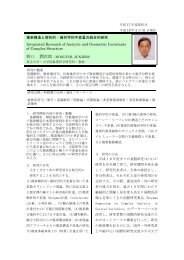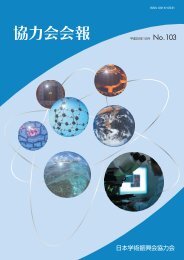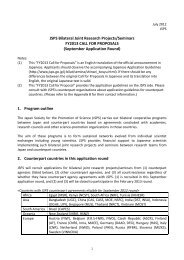"JSPS External Review Report" was issued.(PDF File 1.22MB)
"JSPS External Review Report" was issued.(PDF File 1.22MB)
"JSPS External Review Report" was issued.(PDF File 1.22MB)
You also want an ePaper? Increase the reach of your titles
YUMPU automatically turns print PDFs into web optimized ePapers that Google loves.
2. <strong>JSPS</strong>'s Relation to Government Policy on Science PromotionScience and Technology Basic Plan and <strong>JSPS</strong>’s RoleThe Japanese government enacted the Science and Technology Basic Law in 1995; then, it establishedthe Science and Technology Basic Plan in 1996. With the promotion of basic research beingone of its primary pillars, the Basic Plan calls for increased support to university and otherresearchers. The Second Science and Technology Basic Plan, launched in 2001, places addedemphasis on the promotion of basic science.Following these Basic Plans, <strong>JSPS</strong> has played a pivotal role in promoting basic research in Japan.The <strong>Review</strong> Committee appraises highly <strong>JSPS</strong>’s record of achievement in this pursuit to date.Japan’s Research and Development system and <strong>JSPS</strong>’s positionThe <strong>Review</strong> Committee has acquired an adequate understanding of <strong>JSPS</strong>’s position withinJapan’s research and development framework. As research and development systems differ accordingto each country’s backgrounds, the Committee did not attempt to evaluate the Japanese system.The members did, however, agree that (1) good coordination between the government, science-promotionagencies, universities, and other entities is vital in carrying out research and developmentactivities, and (2) within the Japanese system, <strong>JSPS</strong>’s role of supporting research based on the freeideas of researchers is both vital and should be expanded.<strong>JSPS</strong>’s autonomy and independenceUp till now, basic decisions regarding <strong>JSPS</strong> have been made by MEXT. That is, <strong>JSPS</strong> has theauthority, with the government’s permission, to merge its existing programs or to launch new ones.However, various requirements, such as acquiring related government funding and obtaining permissionto amend its bylaws, make it difficult for <strong>JSPS</strong> to take such actions on its own accord.It is incumbent upon <strong>JSPS</strong> to seek the views of researchers and to give their views concreteapplication in its various programs. <strong>JSPS</strong> must work to foster an understanding within Japan’s governmentaland legislative bodies of the importance of science and of <strong>JSPS</strong>’s policies and programs insupport of scientific promotion. In achieving these two objectives, <strong>JSPS</strong> must secure its own autonomyand independence. Concurrently, it must also strengthen its own planning and policy functions.Cultivating the research environmentIn developing its programs, <strong>JSPS</strong> must gauge and improve the prevailing research climate andenvironment. To this end, it will need to expand its research funding, while working to foster acadre of creative elite researchers who will form the nucleus of future research initiatives. As concretemeasures toward fostering such researchers, their university teaching and administrative obligationsshould be lightened, their domestic and international mobility expanded, and their independenceand freedom assured.24







